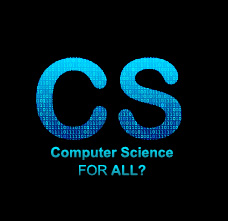 In December, 2013, Rahm Emanuel, Mayor of Chicago produced a 5 year plan to teach computer science in the Chicago public schools from Kindergarten through high school. Within 3 years, computer science and code writing will be a graduation requirement.
In December, 2013, Rahm Emanuel, Mayor of Chicago produced a 5 year plan to teach computer science in the Chicago public schools from Kindergarten through high school. Within 3 years, computer science and code writing will be a graduation requirement.
In California, lawmakers are considering a bill to require Computer Coding for grades 1 – 6.
Today only 10% of our nation’s schools offer computer science and a few have CS as a requirement. However, even in some of these schools the requirement can be met with CAD or Photoshop.
Should CS be a requirement for all public schools? For your public school?
In the article “The Danger of Requiring Computer Science in K-12 Schools author Mark Guzdial argues that we are not ready for computer science in schools. While he seems to argue we should prepare to do this in the future, today we simply are not ready:
- There are few teachers certified to teach CS. In fact, most Schools of Education do not offer this as a course of study.
- While many schools are technology rich, they are curriculum poor. Most CS curriculum is deadly boring and he fears that it will become like math – loved by a few and hated by most.
- While some schools have trained teachers to teach CS (like Scratch in the early grades), professional development is often poor and inadequate.
- He worries about how CS would be taught to students with disabilities.
- We should focus today on getting it required for college graduation and work our way to adding it as a requirement in K-12.
I would add to his list of concerns:
- Our new Common Core and Next Gen Science Standards do not include CS. Many feel we have to stick to our priorities and focus on getting students literate in English, math and science.
- School budgets are strained – is there money to attract CS teachers, pay for what seems annual or bi-annual upgrades to computer hardware and software and afford adequate professional development (and CS is a field of rapid change).
- Do we all really need to be creators of technology and just enjoy being savvy consumers of technology?
But what if we could fix these problems, then what?
In an article last June in Mother Jones magazine, “Is Coding the New Literacy?” Tasneem Raj makes compelling arguments for all children to learn what he calls computational thinking and code literacy. Rather than offering boring curricula to teach kids how to write lines of code, teach them how to think about real problems and how computers might solve them. This would be “anything that can be sorted, counted, or tracked—could be combined and changed into something new by applying various computational techniques.”
“The happy truth is, if you get the fundamentals about how computers think, and how humans can talk to them in a language the machines understand, you can imagine a project that a computer could do, and discuss it in a way that will make sense to an actual programmer.”
Some of the most interesting jobs in the business world are Product Managers, Project Managers, Sales Engineers and IT Business Analysts. There are people who are expert in computational thinking. In these careers you need to be the interface between the business people and the coders. You have to speak both languages – you have to understand the problem the customers need solved or the problems of your own financial, marketing or manufacturing departments and then you have to be able to explain it to the engineers.
So imagine a high school class that doesn’t bury kids in coding but helps them imagine how being computer savvy could help them in any career, and solve real problems. Mr.Raj explores a couple of easy community problems that were solved by students using computation thinking and then developing a simple program to solve the problem.
Today coding is an elite career mostly populated by white or Asian men. Girls, blacks and Latinos are largely absent. To democratize CS we need it to be available in the public schools and taught in a way that makes it compelling and relevant to all of our students.
If we believe we will need tech savvy citizens capable of computational thinking, then what better place for this to happen than in our public schools.
Note from the writer: If you are interested in this topic, join the North Shore Technology Council’s STEM event on November 18th from 6 pm to 8 pm in the Cummings Center Conference Room in Beverly MA. For more information and registration please visit www.nstc.org.

